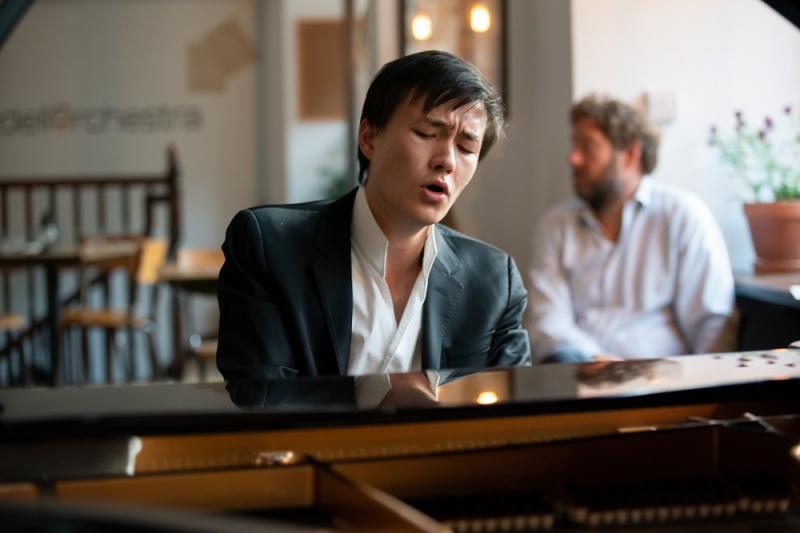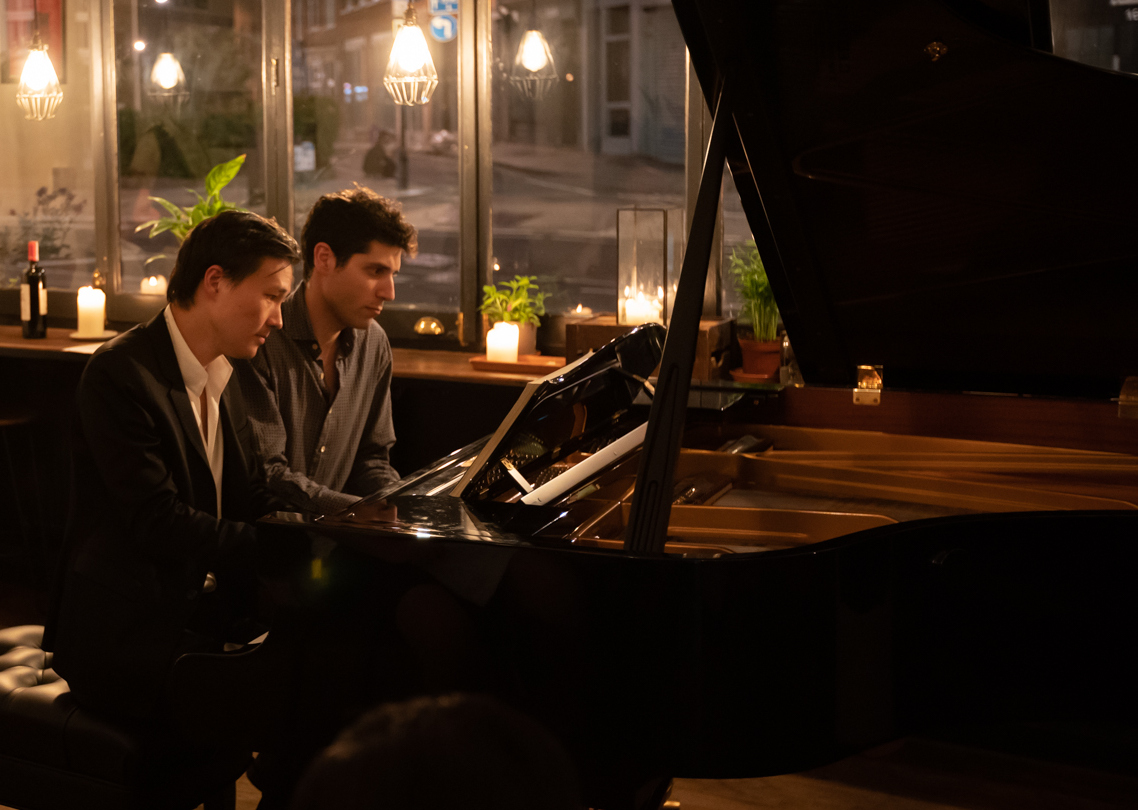Louis Schwizgebel, Fidelio Orchestra Café review – gilt-edged postcards from around the world | reviews, news & interviews
Louis Schwizgebel, Fidelio Orchestra Café review – gilt-edged postcards from around the world
Louis Schwizgebel, Fidelio Orchestra Café review – gilt-edged postcards from around the world
Sonority first in Debussy and Musorgsky, plus profound Brahms cello-and-piano surprises

A front-rank pianist only takes on Musorgsky’s Pictures at an Exhibition in full confidence of being able to handle the massive bells and blazing chants of its grand finale, “The Great Gate of Kiev”. To risk it in a far from large café space adds to the element of danger and excited anticipation.
That said, we’ve been spoiled by the limitless imaginative horizons opened up by the Fidelio Orchestra Café’s earlier visitors over the past three weeks. Comparisons would be odious in any detail, but on the evidence of the Musorgsky and Debussy’s Estampes, an evocative programme indeed, Schwizgebel produces wonderful sounds but doesn’t always let his fantasy fly. The travels of Debussy to the Far East and Spain, of Musorgsky to an Italian castle, the Tuileries Gardens and the Paris Catacombs remained gilt-edged picture postcards, not images come to fully-dimensional life. The piano needs to sing and speak more in this bel canto and gestural music.
Even the encore, Schubert’s A flat major Moment musical, needed just a bit more space and inwardness, though there was true Schubertian subtlety in some of the turns of phrase. The right continuity, too, as Musorgsky’s gallery-tour smashes from the opening "Promenade" through the looking-glass of "Gnomus"; and the sustaining-pedal effect on the last echo of “Catacombs” reminded us that there are effects on the piano that even the orchestra can’t replicate.  One of the beauties of these café recitals as they evolve is the way in which top-notch musical visitors want to join their colleagues in rich extras. Last week we had a profound after-dessert encore as Samson Tsoy joined Pavel Kolesnikov for Schubert’s F minor Fantasie. Last night Schwizgebel and Jonathan Bloxham, still wielding his cello even now that his conducting career has taken off worldwide, complemented our mousse with the slow movement of Rachmaninov’s Cello Sonata and a poised, unsentimental take on Saint-Saëns’ “The Swan”.
One of the beauties of these café recitals as they evolve is the way in which top-notch musical visitors want to join their colleagues in rich extras. Last week we had a profound after-dessert encore as Samson Tsoy joined Pavel Kolesnikov for Schubert’s F minor Fantasie. Last night Schwizgebel and Jonathan Bloxham, still wielding his cello even now that his conducting career has taken off worldwide, complemented our mousse with the slow movement of Rachmaninov’s Cello Sonata and a poised, unsentimental take on Saint-Saëns’ “The Swan”.
Best of all, because the music was arguably the deepest and richest of the evening, were two Brahms movements with the piano parts divided between Schwizgebel and Fidelio Orchestra Café doyen Raffaello Morales (pictured above with Schwizgebel at an earlier evening): the Adagio affetuoso of the Op. 99 Cello Sonata with Morales – its Schubertian poise between minor-key sadness and major-key serenity never more moving than when the “walking” pizzicati step back out in to the light after protesting the dark – and the opening Allegro non troppo of the E minor predecessor, Bloxham’s cello resonance felt through the wood of tables and chairs. At this time musicians just want to play, and we to be there to listen in the room where it happens.
rating
Explore topics
Share this article
The future of Arts Journalism
You can stop theartsdesk.com closing!
We urgently need financing to survive. Our fundraising drive has thus far raised £33,000 but we need to reach £100,000 or we will be forced to close. Please contribute here: https://gofund.me/c3f6033d
And if you can forward this information to anyone who might assist, we’d be grateful.

Subscribe to theartsdesk.com
Thank you for continuing to read our work on theartsdesk.com. For unlimited access to every article in its entirety, including our archive of more than 15,000 pieces, we're asking for £5 per month or £40 per year. We feel it's a very good deal, and hope you do too.
To take a subscription now simply click here.
And if you're looking for that extra gift for a friend or family member, why not treat them to a theartsdesk.com gift subscription?
more Classical music
 La Serenissima, Wigmore Hall review - a convivial guide to 18th century Bologna
This showcase for baroque trumpets was riveting throughout
La Serenissima, Wigmore Hall review - a convivial guide to 18th century Bologna
This showcase for baroque trumpets was riveting throughout
 Sheku Kanneh-Mason, Isata Kanneh-Mason, Wigmore Hall review - family fun, fire and finesse
Intimacy and empathy in a varied mixture from the star siblings
Sheku Kanneh-Mason, Isata Kanneh-Mason, Wigmore Hall review - family fun, fire and finesse
Intimacy and empathy in a varied mixture from the star siblings
 Mahler 8, LPO, Gardner, RFH review - lights on high
Perfect pacing allows climaxes to make their mark - and the visuals aren’t bad, either
Mahler 8, LPO, Gardner, RFH review - lights on high
Perfect pacing allows climaxes to make their mark - and the visuals aren’t bad, either
 Philharmonia, Alsop, RFH / Levit, Abramović, QEH review - misalliance and magical marathon
Kentridge’s film for Shostakovich 10 goes its own way, but a master compels in his 13th hour of Satie
Philharmonia, Alsop, RFH / Levit, Abramović, QEH review - misalliance and magical marathon
Kentridge’s film for Shostakovich 10 goes its own way, but a master compels in his 13th hour of Satie
 Bach St John Passion, Academy of Ancient Music, Cummings, Barbican review - conscience against conformism
In an age of hate-fuelled pile-ons, Bach's gospel tragedy strikes even deeper
Bach St John Passion, Academy of Ancient Music, Cummings, Barbican review - conscience against conformism
In an age of hate-fuelled pile-ons, Bach's gospel tragedy strikes even deeper
 MacMillan St John Passion, Boylan, National Symphony Orchestra & Chorus, Hill, NCH Dublin review - flares around a fine Christ
Young Irish baritone pulls focus in blazing performance of a 21st century classic
MacMillan St John Passion, Boylan, National Symphony Orchestra & Chorus, Hill, NCH Dublin review - flares around a fine Christ
Young Irish baritone pulls focus in blazing performance of a 21st century classic
 Classical CDs: Romance, reforestation and a Rolleiflex
New music for choir, orchestra and string quartet, plus a tribute to a rediscovered photographer
Classical CDs: Romance, reforestation and a Rolleiflex
New music for choir, orchestra and string quartet, plus a tribute to a rediscovered photographer
 First Person: St John's College choral conductor Christopher Gray on recording 'Lament & Liberation'
A showcase for contemporary choral works appropriate to this time
First Person: St John's College choral conductor Christopher Gray on recording 'Lament & Liberation'
A showcase for contemporary choral works appropriate to this time
 Donohoe, RPO, Brabbins, Cadogan Hall review - rarely heard British piano concerto
Welcome chance to hear a Bliss rarity alongside better-known British classics
Donohoe, RPO, Brabbins, Cadogan Hall review - rarely heard British piano concerto
Welcome chance to hear a Bliss rarity alongside better-known British classics
 London Choral Sinfonia, Waldron, Smith Square Hall review - contemporary choral classics alongside an ambitious premiere
An impassioned response to the climate crisis was slightly hamstrung by its text
London Choral Sinfonia, Waldron, Smith Square Hall review - contemporary choral classics alongside an ambitious premiere
An impassioned response to the climate crisis was slightly hamstrung by its text
 Goldberg Variations, Ólafsson, Wigmore Hall review - Bach in the shadow of Beethoven
Late changes, and new dramas, from the Icelandic superstar
Goldberg Variations, Ólafsson, Wigmore Hall review - Bach in the shadow of Beethoven
Late changes, and new dramas, from the Icelandic superstar
 Mahler's Ninth, BBC Philharmonic, Gamzou, Bridgewater Hall, Manchester review - vision and intensity
A composer-conductor interprets the last completed symphony in breathtaking style
Mahler's Ninth, BBC Philharmonic, Gamzou, Bridgewater Hall, Manchester review - vision and intensity
A composer-conductor interprets the last completed symphony in breathtaking style

Add comment